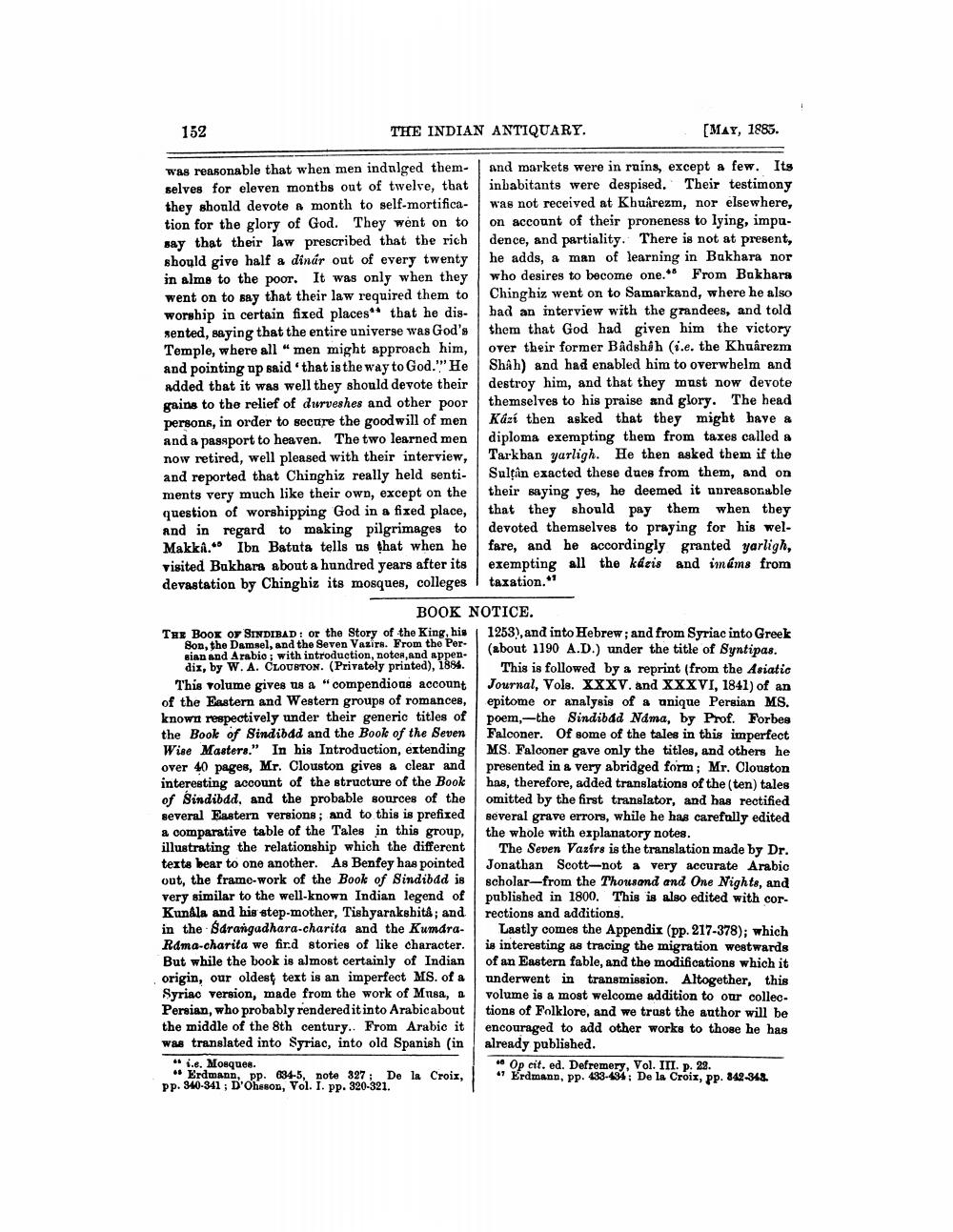________________
152
THE INDIAN ANTIQUARY.
[MAY, 1885.
was reasonable that when men indulged them- selves for eleven months out of twelve, that they should devote a month to self-mortification for the glory of God. They went on to say that their law prescribed that the rich should give half a dinár out of every twenty in alms to the poor. It was only when they went on to say that their law required them to worship in certain fixed places that he dissented, saying that the entire universe was God's Temple, where all "men might approach him, and pointing ap said that is the way to God." He added that it was well they should devote their gains to the relief of durveshes and other poor persons, in order to secure the goodwill of men and a passport to heaven. The two learned men now retired, well pleased with their interview, and reported that Chinghiz really held sentiments very much like their own, except on the question of worshipping God in a fixed place, and in regard to making pilgrimages to Makka." Ibn Batuta tells us that when he visited Bukhara about a hundred years after its devastation by Chinghiz its mosques, colleges
and markets were in ruins, except a few. Its inbabitants were despised. Their testimony was not received at Khuarezm, nor elsewhere, on account of their proneness to lying, impudence, and partiality. There is not at present, he adds, a man of learning in Bukhara nor who desires to become one.** From Bukhara Chinghiz went on to Samarkand, where he also had an interview with the grandees, and told them that God had given him the victory over their former Badshah (i.e. the Khuárezm Shah) and had enabled him to overwhelm and destroy him, and that they must now devote themselves to his praise and glory. The head Kází then asked that they might have & diploma exempting them from taxes called a Tarkban yarligh. He then asked them if the Sultan exacted these dues from them, and on their saying yes, he deemed it unreasonable that they should pay them when they devoted themselves to praying for his welfare, and he accordingly granted yarligh, exempting all the kátis and imams from taxation."
BOOK NOTICE. THE BOOK OY SINDIRAD: or the Story of the King, his 1253), and into Hebrew: and from Syriac into Greek Son, the Damsel, and the Seven Vazirs. From the Per.
(about 1190 A.D.) under the title of Syntipas. sian and Arabio ; with introduction, notes, and appendiz, by W. A. CLOUSTON. (Privately printed), 1854. This is followed by a reprint (from the Asiatic This volume gives us a "compendions account Journal, Vols. XXXV. and XXXVI, 1841) of an of the Eastern and Western groups of romances, epitome or analysis of a unique Persian MS. known respectively under their generic titles of poem.--the Sindibád Nama. by Pm Tor the Book of Sindibad and the Book of the Seven Falconer. Of some of the tales in this imperfect Wise Masters." In his Introduction, extending MS. Falooner gave only the titles, and others he over 40 pages, Mr. Clouston gives a clear and presented in a very abridged form; Mr. Clouston interesting account of the structure of the Book has, therefore, added translations of the (ten) tales of Sindibdd, and the probable sources of the omitted by the first translator, and has rectified several Eastern versions ; and to this is prefixed several grave errors, while he has carefully edited a comparative table of the Tales in this group, the whole with explanatory notes. illustrating the relationship which the different The Seven Vaxfrs is the translation made by Dr. texta bear to one another. As Benfey has pointed Jonathan Scott-not a very accurate Arabic out the frame-work of the Book of Sindibdd is scholar-from the Thousand and One Nichte and very similar to the well-known Indian legend of published in 1800. This is also edited with corKunala and his step-mother, Tishyarakshita; and rections and additions. in the Sarangadhara-charita and the Kumdra- Lastly comes the Appendix (pp. 217-378); which Rama-charita we fir.d stories of like character. is interesting as tracing the migration westwards But while the book is almost certainly of Indian of an Eastern fable, and the modifications which it origin, our oldest text is an imperfect MS. of a underwent in transmission. Altogether, this Syriao version, made from the work of Musa, a volume is a most welcome addition to our collec. Persian, who probably rendered it into Arabic about tions of Folklore, and we trust the author will be the middle of the 8th century. From Arabic it encouraged to add other works to those he has was translated into Syriac, into old Spanish (in already published. * i.e. Mosques.
Op cit. ed. Defremery, Vol. III. p. 22. ** Erdmann, pp. 634-5. note 327 : De la Croix, "Erdmann, pp. 433 434; De la Croix, pp. 842-348. Pp. 340-341 ; D'Oheson, Vol. I. pp. 320-321.




